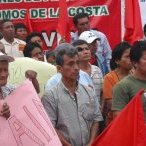
18 September 2012 | Interviews | Land grabbing | Social activists at risk | Food Sovereignty
It Can’t Wait
Ecuador: Preparations for the "Landless Peasants Congress"
Download: MP3 (8.9 Mb)
Download: MP3 (1.4 Mb)
Twelve years after the crisis that resulted in the collapse of the Ecuadorian banking system and currency, large extensions of land in the Ecuadorian coast that were seized by the State, instead of being granted to peasants as established by law, are feeding the “land market” while the possibilities for peasant families to have their own land to produce food are increasingly slimmer.
This turns the Ecuadorian coast into a region where land property is highly concentrated and that’s why peasant organizations are demanding that the integral agrarian reform is respected.
After the crisis that triggered speculation around the value of lands, several organizations decided to occupy empty lands, something which was legally recognized, although the State didn’t grant many property titles, and therefore their situation is unstable.
For this reason, on August there have been two regional meetings to prepare for the “Landless Peasants Congress” on November 15th near Guayaquil, said Milton Yulan, lawyer of peasant organizations and a member of the organization “Union Tierra y Vida” and FIAN Ecuador.
The lawyer said that two thousand delegates are expected, not only from the coast of Ecuador, but from other regions of the country, since the land concentration issue is a national problem. And he remembered that the Ecuadorian Constitution of 2008 established the Food Sovereignty Principle and the Right to Food, which are directly threatened by large extensions of land associated with agribusinesses for export and for the production of agrofuels.
The date chosen relates to the massacre against peasants that took place on November 15th, 1922.
Yulan said that from 1970s, the struggle for land has been very intense in Guayas, Manabi and other provinces of the Ecuadorian coast, a struggle that has been associated with the criminalization and persecution of peasant activists. He also said that there is a “new form of violence” through direct threats by the landowners and legal cases and media attacks.
“We can see that there is no will by current President Rafael Correa to build land and water laws as a basis for the constitutional mandate of Food Sovereignty”, said Yulan.
In this way, the Landless Peasants Congress will seek to make the different current conflicts visible and “establish a common work and action agenda in defense of peasants and for an agrarian reform with an integral vision, not only in the coast but also at national level”, said Yulan from Guayaquil.
But there is also speculation over these lands: today, over 17 thousand hectares have been sold at extremely high prices, above market prices and the President himself has acknowledged that there is an outstanding debt with peasants since access to land is not ensured.
The Landless Peasants Congress will take place in November and will be preceded by three regional meetings, the last of which will be held on October 13 in Machala, where alliances and the political situation of the country in terms of the demands for lands will be discussed in the framework of an electoral campaign which is conditioning the action of social and political actors in Ecuador.
Photo: Union Tierra y Vida







